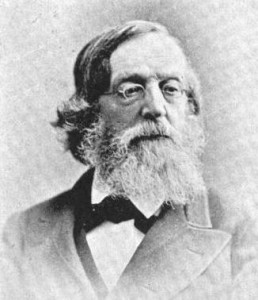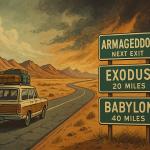Back in January 2011 when I first embarked on Hellbound?, I had no idea how deeply political the idea of hell could be. For me, the film was more of a personal journey, my attempt to grapple with a concept that had both repelled and fascinated me throughout my life as a Christian. As I’ve recounted dozens of times during interviews and Q&A sessions, it wasn’t until I witnessed the reaction to Rob Bell’s book Love Wins that I realized how heated this discussion could get.
The publication of Love Wins–or, more accurately, the trailer that preceded the book’s publication–truly was a watershed moment. Although people like Brian McLaren, Tony Jones, Doug Pagitt and other members of the emergent crowd had been raising similar questions for years, somehow Bell hit the zeitgeist just right, causing an explosion of controversy. At the time, two voices struck me as particularly prescient about the implications of this debate. The first was Jimmy Spencer, Jr., who said (in a writing style reminiscent of Bell’s own),
You’re witnessing something big right now. You’re witnessing a new split in Protestant Evangelicalism.
We have all felt tremors of this thing coming for a couple years now…
Rob Bell’s book will play a huge part in triggering this split.
This is not just about theology. It’s about control of the story of Jesus.
It’s about the entire framing of God and The Gospel.
It may not be nailing 95 theses on a door…
But it could mark a major shift in how Evangelical Christianity represents itself from this point forward.
The other voice was Kevin DeYoung, who said Love Wins represented such a wholesale departure from historic Christianity that he didn’t even known where to begin his critique. Apparently, he overcame his paralysis long enough to bang out a 20-page review, in which he noted:
At the very heart of this controversy, and one of the reasons the blogosphere exploded over this book, is that we really do have two different Gods. The stakes are that high. If Bell is right, then historic orthodoxy is toxic and terrible. But if the traditional view of heaven and hell are right, Bell is blaspheming. Both sides cannot be right. As much as some voices in evangelicalism will suggest that we should all get along and learn from each other and listen for the Spirit speaking in our midst, the fact is we have two irreconcilable views of God.
I couldn’t have put it better myself. The question is, what do these two irreconcilable views of God look like?
The Sacrificial god
This is the god of Kevin DeYoung, Mark Driscoll, John Piper and other “young, restless and Reformed” types. The primary attribute of this god is holiness or otherness. This god’s will is paramount, and violation of his will puts you in danger potentially for all eternity. The Sacrificial god gives a judicial account of sin, which means violating this infinite god’s holiness incurs an infinite penalty or debt that no human is able to repay. The only way to escape this god’s wrath is to hide behind his Son, Jesus, the sole being capable of making the sacrifice necessary to appease this god’s wrath. Because with this god, forgiveness and reconciliation can only be achieved through sacrifice.
Not surprisingly, worshiping this god leads to a binary way of thinking that reflects the either/or mindset of this god:
- In/out
- Us/them
- Clean/unclean
- Sacred/profane
- Truth/error
- Love/hate
This self-centered god also promotes a self-centered existence where your primary concerns are:
- Avoiding god’s wrath
- Self-preservation–perpetuating your individual existence for all eternity
- Keeping yourself pure by adhering to a moral code and compelling others to do the same
- Showing mercy to others, but only as a means to an end–providing a platform from which to warn them to flee the wrath of god before it’s too late.
Serving this god also promotes a hostile religious identity. For worshipers of this god, truth is primarily…
- Propositional vs. Experiential
- Intellectual vs. Emotional
- Literal vs. Metaphorical
- Transactional vs. Relational
- “Conversional” vs. Compassionate
- Affected vs. Authentic
True dialogue–which involves charity, compassion and openness to the other–is impossible for followers of this god. All that’s permitted is debate, with “no expectation of encountering afresh God’s truth, no hope of expanding the horizons of spiritual understanding,” to quote Anglican Bishop Michael Ingham.
Unfortunately, the effects of worshiping this god are not limited to the church. Seeing as many Western nations, such as America, were founded by people who believed in some version of the Sacrificial god, even secular Western states tend to reflect this sacrificial theology. As Jon Pahl has observed in his book Empire of Sacrifice, “Sacrifice—the religious exclusions and substitutions through which power has been concentrated and legitimized—has been a key factor in producing American identity.”
The Self-sacrificial God
Thankfully, the Sacrificial god isn’t the only game in town. Through people like Rob Bell, Brian McLaren, Michael Hardin, Brad Jersak, Joshua Tongol, Rene Girard and even Pope Francis, another God is emerging–the Self-sacrificial God. This God is also holy, but what makes this God holy is not “otherness”; it’s love, particularly love of enemy:
“You have heard that it was said, ‘Love your neighbor and hate your enemy.’ But I tell you, love your enemies and pray for those who persecute you, that you may be children of your Father in heaven. He causes his sun to rise on the evil and the good, and sends rain on the righteous and the unrighteous. If you love those who love you, what reward will you get? Are not even the tax collectors doing that? And if you greet only your own people, what are you doing more than others? Do not even pagans do that? Be perfect, therefore, as your heavenly Father is perfect. (Matthew 5:43-48)
This God is also consenting rather than willful. Instead of imposing his will on us, this God makes room for us and only commands or directs those who make room for him. With this God, sin is a relational problem rather than a judicial problem. Sin is anything that gets in the way of perfect love. As a result, the remedy for sin is not punishment and exclusion but healing and reconciliation. And with this God, forgiveness and reconciliation can only be achieved by self-sacrifice, because self-sacrifice is the very definition of love.
Rather than binary thinking, followers of this God are more prone to think “trajectionally.” That is, rather than being “in” or “out,” with this God, everyone is in, but everyone is also out. All are loved by God, but all are mired in sin. Therefore, everyone is somewhere along the following continuums, ideally moving toward the positive pole:
- Away—————————————Toward (God and the Good)
- Bondage———————————–Freedom
- Illness————————————–Wellness
- Destructive——————————–Constructive
- Illusion————————————Reality
Following this God also promotes an others-centered existence where your primary concerns are:
- Sharing God’s love with others
- Sacrificing your life on behalf of others, if necessary
- “Positivity dominance”–rather than worry about being made unclean, through Christ, we make all things clean
- Mercy as an end in itself–acts of kindness aren’t a platform from which to share the gospel, they are the gospel
This God also encourages a hospitable religious identity, where our approach to truth is primarily:
- Experiential vs. Propositional
- Emotional vs. Intellectual
- Metaphorical vs. Literal
- Relational vs. Transactional
- Compassionate vs. Conversional
- Authentic vs. Affected
Taking all of this into consideration, I wholeheartedly agree with Kevin DeYoung that these two versions of God are completely incompatible. So my simple question to you is, which god most resembles Christ, and which most resembles antichrist? (Not the antichrist but all that is opposed to Christ.) Perhaps that depends on whether your name is Kevin Miller or Kevin DeYoung, but I’m going with door number two. The question is, why do people like Kevin DeYoung (and Kevin Miller, for many years) consistently choose the Sacrificial god?
For starters, because we have been led to believe it is the only faithful reading of the Bible. We have been taken hostage by a theological system that not only indoctrinates us with a toxic view of God, it effectively inoculates us against anyone who might come along to liberate us from it, placating us with sayings like “God’s ways are not our ways” and warning us about “false prophets” and “wolves in sheep’s clothing.” It’s the worst of all possible worlds.
Second, the Sacrificial god makes sense. We live in a “you do the crime, you do the time” world, where justice = retribution. This shouldn’t be surprising considering our world is based on a secularized version of the Sacrificial god paradigm. How could things be any other way? In this sense, I believe the Sacrificial god represents a monstrous failure of imagination.
Third, we find it personally gratifying. Who doesn’t want to be “in”? And after all the sacrifices we’ve made to kiss up to the Sacrificial god, there’s no way in hell we’ll stand for those heathen slackers getting a piece of our pie.
Finally, and perhaps most importantly, we’ve never been introduced to a viable alternative. I have to believe that even the strongest adherents to the Sacrificial god have to at least hope the Self-sacrificial God exists. But many of those folks are convinced that renouncing the Sacrificial god is tantamount to renouncing Christianity, itself. Little do they realize it’s the first step toward embracing it!
So how do we break free from the Sacrificial god? It’s not complicated, but it can be painful. The first step is to reconsider our theological paradigms. How we conceive of the Bible is supremely important to this discussion. If we believe the Bible is like the Sacrificial god–an untouchable legal document designed primarily to winnow the weeds from the wheat–there’s no room for discussion. However, if we take an incarnational approach to the Bible, where we recognize the text is equal parts human and divine, new avenues of dialogue open up. Also important is the realization that God’s primary revelation to us comes not through through the written word but through the Word–Jesus.
Second, we need to reexamine church tradition. Rather than a monolithic entity that has led inexorably to our current theological paradigm, an honest appraisal of tradition will force us to admit that there has always been–and continues to be–a variety of views on any given theological topic. That’s not to say all of these views should be given equal merit. But the Church thrives best when these discussions are allowed rather than suppressed. Because if these questions are suppressed–or, worse, controlled behind a facade of “free and open debate”–they will manifest themselves in ways that are inherently dysfunctional and self-destructive.
Finally, on a personal level, we need to repent–to change our minds, to change the trajectory of our lives. We need to admit that no matter how we’ve dressed it up, our pursuit of God has been largely a fear-driven, self-centered enterprise. That’s nothing to be ashamed of. It’s where everyone begins. And admitting it is the first step toward healing.
Of course, that’s difficult to do if you fear eternal torment in hell is awaiting those who break company with the Sacrificial god. But if you think about it, what could be worse than being forced to serve the Sacrificial god for all eternity?
Hellbound? is available on DVD and VOD starting May 28, 2013. Pre-order your copy here.











